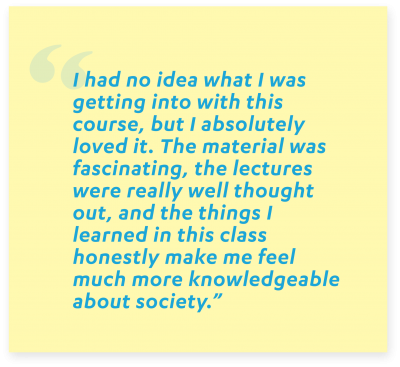CLUSTER 21
| Lecture Schedule: | Monday and Wednesday | 11:00 a.m. – 12:15 p.m. |
| Faculty: | Amir Alexander | History, Coordinator Giulia Sissa | Comparative Literature Theodore Porter | History Zrinka Stahuljak | Political Science |
| Librarian: | Sylvia Page | Powell Library |
| Writing Consultant: | Peggy Davis | Writing Programs |
| Inquiry Specialist: | Lou Baya Ould Rouis |
At some point in all our lives, we have questioned what drives people to certain action. It is in our nature to ask, “What is our place in the world?” or “Why do some have power, while others do not?” These enduring questions have been examined by some of the greatest classic Western thinkers such as Friedrich Nietzsche, Sigmund Freud, Virginia Woolf. Through this Cluster, students are brought into the conversation that has spanned the centuries. By exploring social, political, philosophical, literary and scientific thought from the 17th century to the present, students will learn that the problems, and the solutions proposed through literature are neither simple nor settled. Students are encouraged bring an openness, curiosity and rigorous questioning to class as they engage and wrestle with the ideas presented in class.
What are the Benefits?
- Satisfy 4 GEs requirements
- Satisfy Writing II requirement
- 18 units toward degree
- College Honors units including Honors Collegium
- Priority Enrollment in Eng. Comp. 3
Writing II and Foundation Area General Education Credit
Upon completion of the yearlong cluster, students will fulfill the Writing II requirement and satisfy 4 GE course requirements:
- 3 in Foundations of Society & Culture (1 in Historical Analysis and 2 in Social Analysis)
- 1 in Foundations of the Arts & Humanities (Philosophical and Linguistic Analysis)
Social Thought Minor
For students interested in continuing their academic study of modern thought, consider the Social Thought Minor. The completion of GE Cluster 21A and 21B satisfies all lower division requirements for the minor. See more information on the minor and how to apply .

Course Format
During fall and winter quarters, the course meets twice each week for lectures and once a week for a two-hour section discussion. Discussion topics look at the following themes:
- The source and legitimacy of political authority
- The meaning and limits of human freedom
- The status of women
- The dynamics of capitalist markets
- The role of slavery
- Imperialism and colonialism in the constitution of modern European thought
- The workings of the human psyche
- The limits of reason
Spring Seminars
During spring quarter, students choose a seminar that allows them to explore a particular topic in greater depth. Previous seminar titles have included:
- I Feel, Therefore I Am–I Think: History of Emotions
- Slavery and Freedom: Modern Thought on Drugs
- Humanism between Europe and its Others
- Fantastic Enlightenment
- The Political Animal and its Nonhuman Others
- Being Human: Identity in the Age of Genomics and Neuroscience

